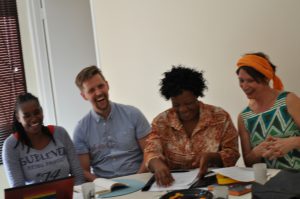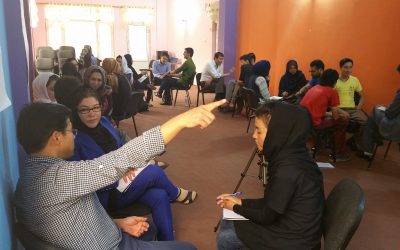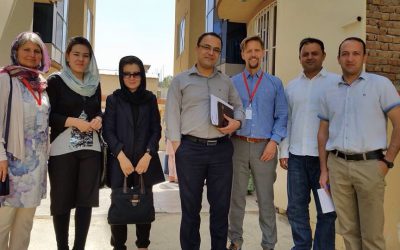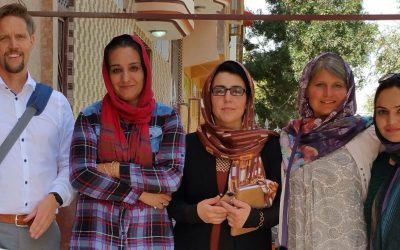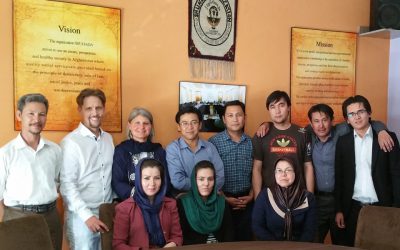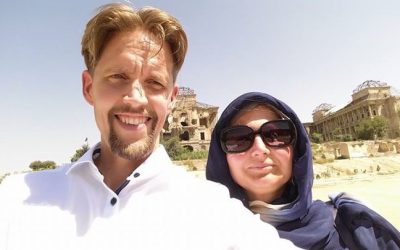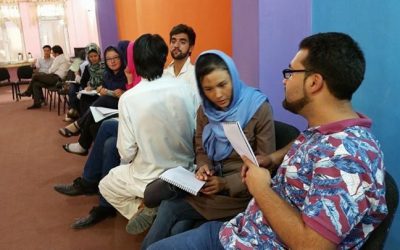Pots of Hope – Planning for Children’s and Women’s Rights
This post is part of our reports from a pre-study that Listeners Without Borders conducted with ABF Malmö funded by the Olof Palme International Center.
We arrived at Windhoek airport on a Saturday, rented our car and drove to Finkenstein Estate, a beautiful, privileged community outside of Windhoek. Casper Erichsen, Director of Positive Vibes, and his family had graciously opened their guesthouse to us free of charge.They wouldn’t be home for a couple of days, so we settled in on our own.
Our first full day in Windhoek was a Sunday. We met Alexia Naris, founder of Pots of Hope, downtown and she escorted us to board member Justina Ndaambe’s home, where we had a planning session, while children were playing around us.
We went through the meeting schedule Alexia had set up for our days in Windhoek, and we did some final adjustments to the baseline questionnaires. We also discussed the main themes for the project.
Children’s Rights
Pots of Hope has information of why projects with children fail in Namibia. The main reason is that the projects don’t include the parents and other significant adults enough.
Child Line Life Line (CL/LL) is a non- governmental organization that render services such as counseling to both children and women either face-to-face or over telephone. They also record stories by children where they are given an opportunity to speak about their experiences on a daily basis and are encouraged to speak from the heart). With their parents consent their stories are then broadcast on local radios to be used as a tool to educate other children that might be going through similar experiences. Support service for children that we can refer children to when they need more one way counseling or other support than the project or Pots of Hope can offer.
Gender Based Violence
With Alexia and Justina, we also spent some time debating whether we should let the project focus on children’s rights only, and not address Gender based violence issues. We concluded that the dual intermediate objectives, children’s rights and gender based violence will work well to implement together, since we will be working with both children, parents and young adults, and the two themes are interconnected
Most children in rural areas have experienced violence in their daily lives which is mainly a result of GBV within their households. We feel that if we do not include the issue of GBV which is on an increase in Namibia then it will be a bit difficult for children to speak out when their rights are being violated. We strongly believe that education starts from home and failure to educate both mother and child as well as young women about issues of rights and GBV will prevent us from achieving our overall goals.
Through GBV activities and awareness children will be able to identify what is right and what is wrong leading to them speaking out and reaching out for help.
A big challenge is that violence towards women is deeply internalized in many women. Most women believe that it is OK for a man to hit a woman as it is a sign of love. This mentality started with our ancestors, if we do not start with the education now then our children will also grow up thinking that it is Ok for men to hit women and no one should question about it.
“When my boyfriend is beating me for having spoken to other men, then I know he loves me.” as one of their previous participants put it. This challenge requires a lot of thinking and reflection, both in small and larger groups, as well as knowledge about how we humans internalize attitudes destructive to ourselves for individuals to start
Posts of Hope has experience conducting community dialogues on women’s rights. In these, they do a one day workshop for women and then one for men. And for the third day, they have women and men meet and discuss women’s issues together. To their experience it is crucial to include the men, and to do it in a way that they don’t get to dominate the dialogue. As one of their young, male participants put it:
In the past many organization when it come to advocating for women’s issues they always focus on women alone but when the women go back to their husbands, who are left out on the discussions and education, the women are often told to leave their human rights outside the door.
“We men are never included in these kinds of activities otherwise. But it comes back to me. If I’m not affected, I will probably keep hitting my woman when she comes back from training, if that’s what I do.”
Traditions to Connect to
Pots of Hope is working in Kamanjab to reach out in their community, and to do that with support of both the local and the regional political leadership as well as of the traditional leadership of chiefs, headmen and headwomen. As we would see later on our pre-study trip, they are quite successful in both of these goals.
Alexia has an idea of using some good, old traditions to promote good, modern rights. There used to be “Dark room sittings” where teenage girls sat with older women, and boys with older men for a traditional education. That practice is not active today, but maybe re-activating them with a content that is gender aware and based in human rights focusing on both girls and boys. If such practices are re-visited it might help reduce the gender based violence, reduce HIV new infections and young men will learn to uphold the rights of the young girls, thus grow up as responsible men.
Categories
Search site
Categories
About us
Our theme will take your workflow to all-new levels of high productivity. We know you’ll find everything you need – and more!
Subscribe to newsletter
[contact-form-7 id=”4151″ title=”Subscribe Form”]
